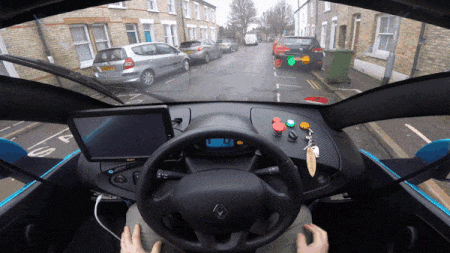In the ever-evolving landscape of autonomous vehicles, U.K.-based startup Wayve stands as a beacon of innovation. Co-founded by Alex Kendall and Amar Shah, Wayve has taken a unique approach, choosing deep-learning algorithms over traditional sensors like LiDAR. Their journey from modifying a compact Renault Twizy to raising an astounding $1.05 billion—making it the largest AI fundraise in the U.K. to date—demonstrates a paradigm shift in how we conceptualize self-driving technology. In an exclusive conversation with Alex Kendall, we dived deep into Wayve’s vision and the road ahead for autonomous cars and robots.
A Revolutionary Approach to Autonomy
Wayve’s initial leap into the autonomous world began with a simple premise: can a vehicle navigate a medieval city without human intervention? Their answer was a resounding yes, a feat achieved through sophisticated AI algorithms trained on diverse data. It’s clear that Wayve has not just been perfecting self-driving software; they’ve been laying the groundwork for a future where machines can intelligently navigate our world.
- **Embodied AI**: Kendall emphasizes the need for “embodied AI,” where machines operate in the real world with intelligence. This term encapsulates not just the driving tasks, but a broader scope of capabilities across various forms of robotics.
- **Data Diversity**: By collaborating with companies like Adsa and Ocado, Wayve has enriched its training datasets. The breadth of scenarios helps produce an AI that understands the unpredictability of real-world environments—think cyclists dodging in and out of traffic and unclear lane markings.
The Road to Licensing
After establishing a robust technological foundation, Wayve is ready to license its autonomous driving model across the globe. Kendall envisions a future where not just high-end vehicles, but cars of all calibers integrate their technology. The benefits of this strategy are multifold:
- Scalability: By partnering with multiple automotive manufacturers, Wayve can leverage a variety of vehicles to gather expansive data for training purposes.
- Sustainable Business Model: A platform-independent technology fosters widespread adoption, ensuring that Wayve’s AI can adapt and scale, regardless of the car brand.
This diversification will not only enhance the AI’s performance but also ensure safety and reliability, ultimately revolutionizing the self-driving market.
The Competitive Landscape
While Wayve pushes forward, the autonomous vehicle domain has seen a mix of advancements and challenges. Kendall notes that many ambitious projects have plateaued in recent years, which makes Wayve’s advancements particularly exciting. Their approach integrates neural reasoning and real-time data processing, enabling the vehicles to make quick adjustments—a logistical leap compared to present limitations.
Additionally, Wayve’s commitment to a world without expensive LiDAR setups could democratize autonomous driving technology. “This will allow technology to flourish in urban environments while keeping human safety at the forefront,” states Kendall.
Looking Ahead: From Cars to Robots
The vision doesn’t stop with vehicles. Wayve is aspiring to pave the way for the next generation of domestic robots, employing their AI architecture beyond just driving. “Imagine a robot that can assist in daily chores or navigate a home environment with the same level of sophistication as a self-driving car,” Kendall shares.
This dual-focus strategy amplifies Wayve’s potential audience—spanning both the automotive sector and the burgeoning market for autonomous domestic robots, solidifying their aspirational goal of creating a truly integrated AI system.
Support from the Tech Giants
Funding from significant players like SoftBank and Microsoft isn’t just a badge of honor; it’s a strong endorsement of Wayve’s vision. Such partnerships allow them access to unparalleled resources, particularly in GPU power via Azure, which will be pivotal in scaling their AI effectively. This strategy positions Wayve at the forefront of not just innovation but also implementation, ensuring they remain competitive in a rapidly changing market.
Conclusion: A New Era of Intelligent Machines
Wayve embodies the future of intelligent machines—moving beyond perception to action. As we inch closer to a reality where self-driving cars are commonplace, the implications for society are vast. They promise not just convenience, but a transformation in how we interact with technology. If successful, Wayve’s efforts could lead the charge in reshaping urban design, travel safety, and even the nature of work.
For more insights, updates, or to collaborate on AI development projects, stay connected with fxis.ai.
At fxis.ai, we believe that such advancements are crucial for the future of AI, as they enable more comprehensive and effective solutions. Our team is continually exploring new methodologies to push the envelope in artificial intelligence, ensuring that our clients benefit from the latest technological innovations.

